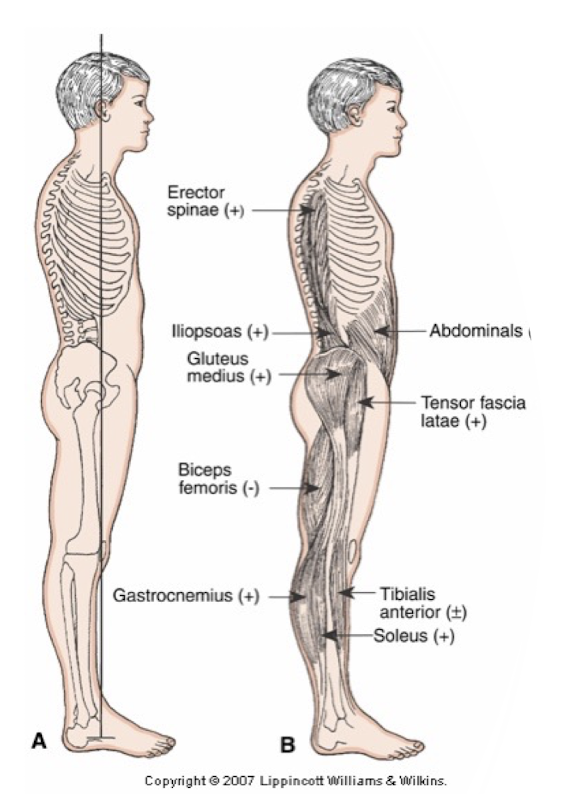Postural Control
1/28
There's no tags or description
Looks like no tags are added yet.
Name | Mastery | Learn | Test | Matching | Spaced |
|---|
No study sessions yet.
29 Terms
What is postural orientation?
Ability to maintain useful relationships between body segments AND between the body and the environment to perform a task
What is postural stability?
Ability to control COM in relationship to the BOS.
Formal phase for balance
What is a key variable controlled by the postural control system?
COM
What is center of gravity (COG)?
Vertical projection of COM on the ground
What is center of pressure (COP)?
Center of distribution of total force applied to a supporting surface
What two components are involved with a task?
Orientation and stability
What is steady state balance control?
Keeping COM in BOS in reasonably predictable, unchanging conditions.
No dual tasking, can still be moving
What is reactive balance control (aka feedback control)?
Unexpected challenges to posture. Ex: tripping and recovering your balance.
What is anticipatory/proactive (aka feedforward control)?
Expected challenges to posture.
What is the alignment of the plum line in static stance (aka quiet stance)?
Between mastoid
A point just in front of shoulder joints
Hip joints or just behind
Point just in front of center of knee joints
Point just in front of ankle joints

Are there small amounts of postural sway in quiet stance?
Yes
The ankle strategy is normally used to recover balance in response to what?
A small, slow push
A loss of balance (LOB) occurring in the anterior-posterior direction
What muscles are used to recover from forward sway in ankle strategy?
Gastroc
Hamstrings
Paraspinals at end
What muscles are used to recover from backward sway in ankle strategy?
Ankle DFs
Quads
Abdominals
Hip strategy is normally used to recover balance in response to what?
Large, fast push
Push coming from A-P OR M-L direction
What muscles are activated to recover from forward sway in the hip strategy?
Abdominals and quads
What muscles are activated to recover from backward sway in the hip strategy?
Paraspinals and hamstrings
When is suspensory strategy used to recover balance?
Catching a heavy object or moving over an unstable surface.
Classic example is walking over an unstable floor, like water on tile or ice.
How does suspensory strategy present?
Person will lower their COG with B LE flexion or a small squat
When is the stepping strategy used to recover balance?
Individual to each person
Usually when the limit of balance is reached and BOS has to change
People may use it when no specific instructions are given on how to catch oneself.
What form of reactive control is stepping strategy known as?
Protective.
When is reach-to-grasp normally used to recover balance?
When the limit of balance is reached and BOS has to change
Compare the speed at which the act of taking a step or reaching to grasp to correct balance is to volitional stepping/reaching?
To correct balance is twice as fast
What form of reactive control is reach-to-grasp strategy known as?
protective
What is the primary joint for recovery of stability in ML direction?
Hip
Clinically, when you ask someone to do a SLS, what posture/balance controls are you looking at?
Anticipatory postural control
Proactive balance control
At what age does all three sensory systems contribute to balance?
7 years old
What is the cognition component of focus?
Attention; seen as a limited resource
Is posture a priority in intact young adults?
Ye